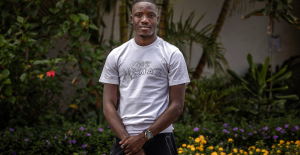Normally, on the evening of a state election, a federal chairman of a party first says something about the state and the conditions there. But AfD boss Tino Chrupalla made an exception on Sunday: Shortly after 6 p.m., after a minimal swerve about a “super election campaign”, he spoke on ARD immediately about the “tailwind from the federal government”, about “failed federal policy”.
Chrupalla made it clear from the start how much the party in Lower Saxony needed the nationwide mood. But it was also good for them: the AfD was able to significantly increase its share of the vote.
However, it cannot be said that the Lower Saxony AfD would have done much for this. Conversely, in recent years it has done almost nothing that puts a party on the sidelines. After the AfD entered the state parliament for the first time in 2017 with 6.2 percent, they let their old disputes continue to escalate with almost relish. Financial scandals were combined with directional struggles between right-wing extremists, right-wing radicals and moderate currents, with the latter becoming increasingly weakened by leaving the party.
In voting battles in lists and board elections, sometimes one camp won, sometimes the other, which then led to revenge campaigns by the defeated. The federal board tried several times to mediate between the hostile groups, who denounced each other as "prey communities". In the state parliament, the AfD, which was drafted with nine MPs in 2017, lost several members and lost its parliamentary group status in 2020.
A truce was concluded between the camps in the run-up to the current election for board and list elections, with two somewhat less radical politicians making it to the top in the form of country chief Frank Rinck and top candidate Stefan Marzischewski-Drewes.
"We are no longer at odds," said Marzischewski-Drewes on Sunday. But peace has not returned in the past few months.
In June, Rinck received a penalty order for driving without a license, and shortly before the election it became known that the public prosecutor's office in Hanover was investigating state deputy Ansgar Schledde, who is in second place on the state list.
The investigation is likely to have something to do with the fact that Christopher Emden, who left the AfD in July, accused Schledde of having offered list places at a price of 4,000 euros and having deposited the money in a slush fund. Schledde denies that. Emden justified his resignation in the summer by saying that the state AfD was a "collecting basin for losers, gangsters and the underprivileged".
In view of all this, the only explanation for the strengthening of the AfD in Lower Saxony is that it has become a projection screen for radical sentiments in times of recession fears and rising energy prices. Marzischewski-Drewes had tailored the election campaign entirely to the issues of prices and energy, in which he and his fellow party members promised relief for the citizens and called for nuclear and coal-fired power plants to continue operating. They don't want to know anything about the further expansion of renewable energies.
The fact that the AfD grew stronger by concentrating on economic problems and by invoking “hot autumn” and “fury winter” confirms the course of the federal leadership around Tino Chrupalla and Alice Weidel. As can be seen at a demonstration in Berlin on Saturday, the party relies entirely on economic fears in accordance with the way of thinking that AfD federal executive board member Harald Weyel made clear in September.
He said, while the microphones were still open, in conversation with another participant on his statement that the economic development could be dramatic: "You have to say, hopefully, right? If it doesn't get dramatic enough, then it's business as usual."
After the state elections in Lower Saxony, Stephan Weil sees a clear government mandate for himself. "The voters have given the SPD the government mandate and no one else," said the Prime Minister. Saskia Esken comments on this in the WELT interview and also on the AfD result.
Source: WORLD
Such thoughts should now spread even further in the AfD. On Sunday evening on ZDF, Chrupalla even brought out the biggest fear-monger imaginable: “We are on the threshold of a third world war. That worries people.” And that is why the AfD wants “a de-escalation”, namely “peace negotiations with Russia”. The sanctions would have to be ended so that Germany “can get cheap gas from Russia again”.
There is another reason why the party will continue to rely on the fears of the population, that it wants to conjure up and exploit them: the left did very badly. This shows that both radical fringes are currently not benefiting from impoverishment-theoretical, system-oppositional conjurations of a general crash.
But only the right one. "We are," said Chrupalla, "a clear Germany party."
"Kick-off Politics" is WELT's daily news podcast. The most important topic analyzed by WELT editors and the dates of the day. Subscribe to the podcast on Spotify, Apple Podcasts, Amazon Music, among others, or directly via RSS feed.

 Sydney: Assyrian bishop stabbed, conservative TikToker outspoken on Islam
Sydney: Assyrian bishop stabbed, conservative TikToker outspoken on Islam Torrential rains in Dubai: “The event is so intense that we cannot find analogues in our databases”
Torrential rains in Dubai: “The event is so intense that we cannot find analogues in our databases” Rishi Sunak wants a tobacco-free UK
Rishi Sunak wants a tobacco-free UK In Africa, the number of millionaires will boom over the next ten years
In Africa, the number of millionaires will boom over the next ten years WHO concerned about spread of H5N1 avian flu to new species, including humans
WHO concerned about spread of H5N1 avian flu to new species, including humans New generation mosquito nets prove much more effective against malaria
New generation mosquito nets prove much more effective against malaria Covid-19: everything you need to know about the new vaccination campaign which is starting
Covid-19: everything you need to know about the new vaccination campaign which is starting The best laptops of the moment boast artificial intelligence
The best laptops of the moment boast artificial intelligence Bitcoin halving: what will the planned reduction in emissions from the queen of cryptos change?
Bitcoin halving: what will the planned reduction in emissions from the queen of cryptos change? The Flink home shopping delivery platform will be liquidated in France
The Flink home shopping delivery platform will be liquidated in France Bercy threatens to veto the sale of Biogaran (Servier) to an Indian industrialist
Bercy threatens to veto the sale of Biogaran (Servier) to an Indian industrialist Switch or signaling breakdown, operating incident or catenaries... Do you speak the language of RATP and SNCF?
Switch or signaling breakdown, operating incident or catenaries... Do you speak the language of RATP and SNCF? Who’s Who launches the first edition of its literary prize
Who’s Who launches the first edition of its literary prize Sylvain Amic appointed to the Musée d’Orsay to replace Christophe Leribault
Sylvain Amic appointed to the Musée d’Orsay to replace Christophe Leribault Jeremy Allen White to play Bruce Springsteen for biopic
Jeremy Allen White to play Bruce Springsteen for biopic In Los Angeles, Taylor Swift hides clues about her new album in a library on the street
In Los Angeles, Taylor Swift hides clues about her new album in a library on the street Skoda Kodiaq 2024: a 'beast' plug-in hybrid SUV
Skoda Kodiaq 2024: a 'beast' plug-in hybrid SUV Tesla launches a new Model Y with 600 km of autonomy at a "more accessible price"
Tesla launches a new Model Y with 600 km of autonomy at a "more accessible price" The 10 best-selling cars in March 2024 in Spain: sales fall due to Easter
The 10 best-selling cars in March 2024 in Spain: sales fall due to Easter A private jet company buys more than 100 flying cars
A private jet company buys more than 100 flying cars This is how housing prices have changed in Spain in the last decade
This is how housing prices have changed in Spain in the last decade The home mortgage firm drops 10% in January and interest soars to 3.46%
The home mortgage firm drops 10% in January and interest soars to 3.46% The jewel of the Rocío de Nagüeles urbanization: a dream villa in Marbella
The jewel of the Rocío de Nagüeles urbanization: a dream villa in Marbella Rental prices grow by 7.3% in February: where does it go up and where does it go down?
Rental prices grow by 7.3% in February: where does it go up and where does it go down? With the promise of a “real burst of authority”, Gabriel Attal provokes the ire of the opposition
With the promise of a “real burst of authority”, Gabriel Attal provokes the ire of the opposition Europeans: the schedule of debates to follow between now and June 9
Europeans: the schedule of debates to follow between now and June 9 Europeans: “In France, there is a left and there is a right,” assures Bellamy
Europeans: “In France, there is a left and there is a right,” assures Bellamy During the night of the economy, the right points out the budgetary flaws of the macronie
During the night of the economy, the right points out the budgetary flaws of the macronie These French cities that will boycott the World Cup in Qatar
These French cities that will boycott the World Cup in Qatar Tour of the Alps: Simon Carr takes on the 4th stage of the Tour of the Alps, marked by a big scare
Tour of the Alps: Simon Carr takes on the 4th stage of the Tour of the Alps, marked by a big scare Cycling: in video, Chris Harper's big scare on the 4th stage of the Tour des Alpes
Cycling: in video, Chris Harper's big scare on the 4th stage of the Tour des Alpes Football: Mathieu Coutadeur will retire at the end of the season
Football: Mathieu Coutadeur will retire at the end of the season Athletics: young Tebogo says African sprinters will dominate the season
Athletics: young Tebogo says African sprinters will dominate the season


















